Three co-founders, nine years, millions in lifetime revenue 💰 AMA!
Heya Indie Hackers! We're Josh, Ben, and Starr (collectively, some know us as the 'Badgers)—together, we run Honeybadger.io, an error monitoring service for web developers. We're also the hosts of FounderQuest, a podcast about business where we frequently find ourselves waaaaay off-topic.
As of RIGHT THIS MINUTE, it's been 9.23 years since we committed the first code to Honeybadger. 🤯 We sure have learned a lot along the way. :)
Do you have any questions for us? Send them our way in the comments, we'll be around all day. 👇

PS: follow Josh, Ben, and Starr on Twitter if ya want to keep up with us there






Now that you've started HookRelay, How do you divide the effort between multiple products? Where do you want the future of the company to go? Multiple SaaS's?
We currently spend the majority of our time on Honeybadger the product. It's similar to an agency that decides to start a SaaS... the established revenue stream gets the lion's share of the attention. :) So we have to periodically remind ourselves to carve out some time for Hook Relay, and we've also leveraged contractors for Hook Relay work.
We do want to have multiple SaaS products as part of the Honeybadger Industries portfolio. I like to say that we want to be like Wildbit when we grow up. :)
Second on the amazing ❤️ love the podcast! Speaking of, when is the next episode? It's been a while.
What does your roadmap look like forward? From your emails it sounds like reliability? Is there a play here with on-call? hint hint PagerTree ;) From your podcasts it almost sounds like you all might be trying to position the business to either sell or handoff to employees to run. Anything you can share here on that front?
Hey Austin!
We just finished recording our next episode, so expect it next week. :) We're (mostly) done with summer vacations, so we should be back to our normal, weekly schedule for the foreseeable future.
As for a roadmap, we try really hard not to talk about future plans, to maximize flexibility and minimize disappointment when we don't make a promised date. ;)
That said, here are a couple of areas of focus for us:
About selling the business or handing it off to employees... both of those outcomes are actually the same result: you hand the roles & responsibilities you are currently performing to someone else. On top of that, the steps you take you prepare for that kind of transition are the same kinds of steps you take to make the company more resilient to negative events like founder illness or death, etc., which are great steps to be taking for your customers' sake (they can keep deriving value from the business even if you personally aren't actively providing that value). We like the idea of being prepared, either to sell if the right offer came along, or to walk away, if we ever get tired of running the business, so we'll keep doing that kind of work and talking about that kind of scenario. At the very least, doing those kinds of things will allow us to temporarily walk away and take a vacation! :)
Wow! What a great reply, did not expect this kind of depth.
Really look forward to next episode of FounderQuest, it's something I really look forward to on Fridays.
In regards to the business - thanks for sharing. That's really neat you are trying to maximize revenue per employee.
Just food for thought (I don't expect a reply on this) in regards to pleasing the enterprise space, could HoneyBadger be deploy on prem like a PaaS? Like as part of an AWS marketplace offering? I am currently trying to move towards this with PagerTree. I believe that by doing this you can bypass a lot of red tape with the enterprise customers and it then doesn't have to pass the CTO or CFO desk, it becomes literally an AWS budget question that might be up to PMs or developers. Anyways, just food for thought.
I'll check-in with your team via email, see if there is something we can do integration wise between PagerTree and HoneyBadger.
Thanks for the reply :) It's really cool you all take the time to respond both here, email and twitter. Would be cool to get introduced to Starr at some point too.
Best,
Austin
Oh yeah, we've spent a lot of time thinking about this, and we've even made some progress towards making it happen. :)
Just wanted to say you're all amazing. ✌️❤️
I'm curious about the early days. How did you acquire customers and how long did it take before the business was sustainable?
Thank you! I'd be happy to talk a bit about our early days.
We launched in 2012. If you’d like to see an early version of our website, it’s on the Wayback Machine: http://web.archive.org/web/20130424053932/https://honeybadger.io/ . If you can’t tell, those were the days when the dominant design trend was drop shadow text on a scan-line background.
The three of us were Rails developers as that platform had exploded in popularity. So there were all these new Rails apps being created. They all needed error monitoring. But the solutions that existed were not great. If you talked to developers at that time, they were actually angry about the quality of service they were getting from these companies. One of those developers was me. So the three of us decided to launch a competitor.
We developed our minimum viable product pretty quickly, over a few months because we were worried those competitors would fix their problems before we could get a toehold.
When we launched, Ben sent an email to his list of a hundred or so Rails developers that he had from a previous business venture. Then we started going to conferences. At first we couldn’t even afford to buy tickets, so we’d hang out in the halls and chat with people. All we had to do was say we had a new error monitoring app and peoples faces lit up. They were that ready for a change. Later on of course, we sponsored a lot of those conferences. We gave away lots of stickers and t-shirts.
The business was completely bootstrapped. I remember thinking Ben was a baller because he fronted us the $80/mo to rent a dedicated server. Now we pay something like $10,000/mo. The business paid for itself from the beginning, but we didn’t start paying ourselves a part-time wage until 2014 - maybe a year and a half after launch. Later that year we bumped up our pay to full-time.
I would say that the most important factor in our early success was that we launched into a market that was really hungry for a product like ours and were willing to pay for it. Early on customer acquisition was pretty easy. It was only later, after the market became a lot more saturated with competitors that it got a bit harder.
Look at that amazing landing page! We were so awesome we didn't even need a sign-up button. 😁
It's at the BOTTOM of the screen josh! That's where all high-converting pages have their CTAs! Jeez
😂
I would like to say that Honeybadger ❤️s Chris Oliver.
🥰
In those days we also put some effort into regularly sharing cool Ruby stuff on Twitter (and even did promoted Tweets, which was Starr's idea IIRC). The goal was to get people who already knew and liked us to retweet our tweets so we'd get into the timelines of people who didn't yet know us. I think those efforts got us some good results in getting early trials and word of mouth referrals.
I once angered Mike Perham when I forgot to include an open-source license in our Ruby gem. That got us some new customers, including Mike's company at the time, and we've been good friends ever since. 😁
LOL that's great. I like that focus on just being a helpful part of the community to grow the business. 💪
How do you go about finding what ideas to work on? Im stuck in a rut on trying to get which thing I should build next.
Yeah, that's a tough one. Whenever we hit a snag or friction with whatever we're working on, and we think "wouldn't it be great if there was a thing that did X", and then we can't find that thing, we think about building it. :)
Thank you! Ill be asking that question more often.
Are you rich?
💖 We're rich in love 💖
If you'd shown me to myself 20 years ago and asked "is this lady rich?" I would have said yes. But most Sr. FAANG engineers probably make a higher salary than me. But they don't own 1/3 of a company. So idk. I don't think of myself as rich currently.
But now that I think of it, that's EXACTLY what a rich person would say. I give up. 😵
You might get an answer from all three of us on this one. :)
I feel very rich, in that I get paid well to do what I enjoy, and I have all the autonomy I want. Life is good!
I don't think of myself as rich, but I do enjoy the financial independence I've built so far. I'm sure we're all rich by some standard.
How many hours do you work on a typical day?
Usually between 4-8 hours/day for 30 hours/week. We really value being able to control our personal schedules and take time off during the week when we need it. Of course, when we feel like working overtime, we do. :)